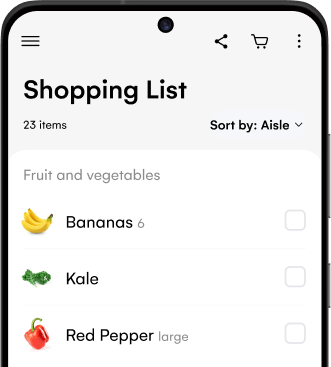Estimated reading time: 6 minutes
Overeating can easily derail your weight loss and fitness goals. But sometimes, the underlying cause for overeating may be something outside your direct control—your hormones. This is particularly true for women, where hormones fluctuate throughout the month dependent on their monthly menstrual cycle. And of course, for pregnant women.
Analyse nutritional information for any recipe

Hormones control your organ’s functions and can affect your emotions too. When you’re feeling blue, bored, or stressed, food can seem very appealing. But eating because of how you feel—or emotional eating— is linked with feelings of shame, guilt, and regret. And it can cause unwanted weight gain too.
Not all emotional eating is caused by hormones, but it can be a factor for some. Here’s the science behind hormones and their impact on emotional eating, and ways to make it work for you.

The link between hormones and overeating
Research shows that you are more likely to reach for comfort food during certain parts of your menstrual cycle. A study by researchers in Michigan found that you are up to four times more likely to eat for emotional reasons during the third and fourth week of your menstrual cycle than you are during the first two weeks of your cycle.
Hormones like estrogen and progesterone influence emotional eating in different ways throughout your menstrual cycle. In the first two weeks of your menstrual cycle, rising estrogen levels make you less likely to use food for comfort and to start overeating for hormonal reasons.
During this time, your emotional eating is less likely to be hormonal. Instead, you’re more likely to be influenced by external triggers to eat. These external triggers include things like being with friends or attending a social event.
In the second half of your cycle, however, estrogen levels are lower and progesterone is higher. The higher progesterone levels are linked to a higher chance of emotional eating and overeating due to hormones. As a result, you may experience a stronger urge to eat more that comes from within. Maybe you’re feeling stressed or sad and turn to the chocolate for comfort, or perhaps your go-to oily takeout just feels right after a rough day.
Dangers of emotional eating
Typically, emotional eating is centered around high calorie “comfort foods” that are low in nutrients. Emotional eating often also involves eating extra meals or calories beyond your daily requirements. This can lead to eating disorders like overeating and purging after meals (bulimia).
Emotional eating can also make you gain excess weight and become overweight or obese. Being overweight or obese has been linked to several health conditions including high blood pressure, diabetes, and heart problems. On top of that, people often experience intense feelings of guilt and shame, which can lead to knock-on effects on your mental health.

Tips for managing emotional eating
If you know you tend to eat emotionally, especially over certain times of the month, how can you better cope with it?
1. Understand your menstrual cycle
Understanding your menstrual cycle can help you work with it instead of against it. You can predict the times when you feel a stronger urge to eat for comfort and plan ahead.
2. Plan ahead
Based on your menstrual cycle you can anticipate the days when the urge for emotional eating will be stronger and during that time you can plan to:
- Eat low calorie, high volume foods like a salad to fill you up
- Drink low calories drinks like black or green tea
- Keep high calories foods out of your fridge and pantry.
3. Practice mindful eating
If you find that your meals tend to be part of a multitasking marathon, you may consider adopting mindful eating. Mindful eating involves focusing on your meals and being deliberate about what you eat. You aren’t to distract yourself in any way with TV or any devices, but to focus on the meal. Mindfulness discourages distracted eating that’s commonly seen with emotional eating and makes you conscious of your food choices.
Plan ahead and say goodbye to meal time madness

4. Consider keeping a food diary
What you measure is easier to manage than what you don’t. A food diary can help you track what you eat over time. This can help you notice trends in the foods you eat and your menstrual cycle.
With this record, you can deliberately track the choices you make month by month and adjust them to suit your goals. And you can easily see when you are winning which can motivate even more positive change.
5. Plan for other sources of comfort
Knowing how your hormones can affect your urge to eat gives you an advantage. You can plan for other ways to cheer yourself up and support yourself emotionally, especially during the second half of your cycle. You could
- Take a walk
- Enjoy a massage
- Listen to music
- Watch funny videos
6. Visualize the benefits of staying focused
Visualizing the benefits of not eating food for comfort can strengthen your self-control and reduce the urge to eat for comfort. You can close your eyes and visualize your fitness and health goals met.
You could see yourself:
- lifting heavier weights
- running faster
- swimming more laps
- being in a happier mood
- fitting into your favorite dress
- climbing the stairs without panting
Overeating might feel good in the moment, but these goals will give you longer term satisfaction.

7. Consider seeing a professional
Sometimes, you find that you need help to change certain habits. A therapist can work with you to manage emotional eating. If you find that emotional eating is disturbing your life or worsening despite your best attempts, it might be a good idea to seek help.
Banishing hormonal overeating
Your hormones can make you more likely to engage in emotional eating and hinder your fitness goals. Knowing the way your hormones influence your urge to eat can help you manage the urge and reduce emotional eating and overeating. If you find that the urge is out of control, speaking to a healthcare provider is a good idea.
Download Samsung Food app to see how it can help you plan meals which help keep you full and satisfied through detailed nutritional info and health score for each recipe.



